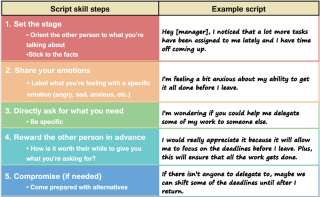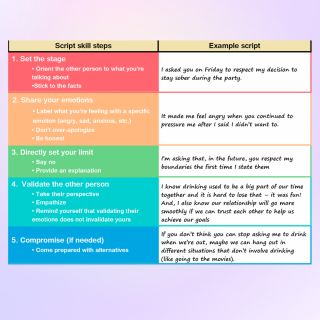Relationships
The Goldilocks Method for Getting Your Needs Met
Ask for what you need and set limits without being too meek or too forceful.
Posted June 9, 2024 Reviewed by Jessica Schrader
Key points
- Finding the middle ground between asking too forcefully or too meekly can help you get what you need.
- Your needs and limits are unique to you.
- Writing a script and practicing can maximize your chances of getting what you need.
As social beings, we need things from other people. Your needs are unique to you, the relationship, and your particular circumstances. For example, you may find that you need to ask for a raise from your supervisor, or you may need more displays of affection from your partner. It can be tricky to find the right balance of what to do and say to effectively ask for what we want or need. People with a history of not getting what they need from others (caregivers, partners, etc.) may find this especially hard; you may have trouble trusting that others can really give you what you need. Or, perhaps past relationships have led you to believe that you don’t deserve to get what you want from others. This can lead to “over-correcting” behaviors such as intensely demanding what you need or not asking at all. Unfortunately, these types of relationship behaviors make it even less likely to get what we need from others.
A limit is a boundary you set for yourself when you are not physically or emotionally able or comfortable giving someone else what they want. Just like our needs, our limits are natural, vary from person to person, and are influenced by values, culture, and specific circumstances. Limits can be physical (e.g., personal space, boundaries with sexual behaviors) or emotional (e.g., sacrificing your needs for others, taking too much on at work or in a relationship). They can even be different at different times. For instance, we may have more narrow emotional limits after a stressful day at work than after a restful weekend. Often, a limit looks like saying “no” to someone’s request.
It can be hard to effectively set limits, especially when you haven’t seen effective limit-setting modeled by others in your life (caregivers, romantic partners, co-workers, etc.). In fact, you may not know what your limits are until they get crossed. Ask yourself: are there relationships where you always give more than you get? Do you struggle to stick up for yourself? Some people find it hard to set limits because they feel like they don’t deserve to feel safe or comfortable (e.g., take on too much at the expense of their well-being). Others want to be safe and comfortable so badly that they might over-set limits (e.g., say no to everything). Setting balanced, values-driven limits, and communicating these limits effectively can promote healthy relationships, decrease conflict, and leave you with more self-respect.

If you need something, you may need to find a middle ground between demanding and not asking at all. People who are skillful in relationships often think about how they’ll frame a topic before they start talking. They are developing a script before they even approach the other person. Developing your own scripts will help you better understand exactly what you need and helps the other person know exactly what you’re asking for (so they have a better chance of giving it to you). Your script when you need something should include the following parts: 1) Set the stage; 2) Share your emotions; 3) Directly ask for what you need; 4) Reward the other person in advance; and 5) Compromise if needed.

To set limits, you can use the same script template, with a few adjustments. It is just as important to draft what you want to say to someone when setting a limit as it is when asking for something you need. To set a limit: 1) Set the stage; 2) Share your emotions; 3) Directly set your limit; 4) Validate the other person; and 5) Compromise if needed.
When you practice, remember that you can’t force someone else to change their behavior. In other words, you can be justified in needing something, skillfully ask for what you need, and still not get what you want. This is because others may be incapable of giving you what you need (e.g., they don’t have the money or power to give you a raise) or unwilling to do so for any number of reasons. Similarly, you may have effectively identified and communicated a limit, and the other person may still disregard it. For example, you may tell someone that you aren’t comfortable with sexual behaviors on a first date, and your date may put you down for setting this limit or try to persuade you to cross it because they have different limits. By identifying and sticking to your limits, you’ll likely end up feeling better about yourself and your relationship behaviors. Asking for what you need and setting limits takes a lot of practice but can be very rewarding in the long run.


